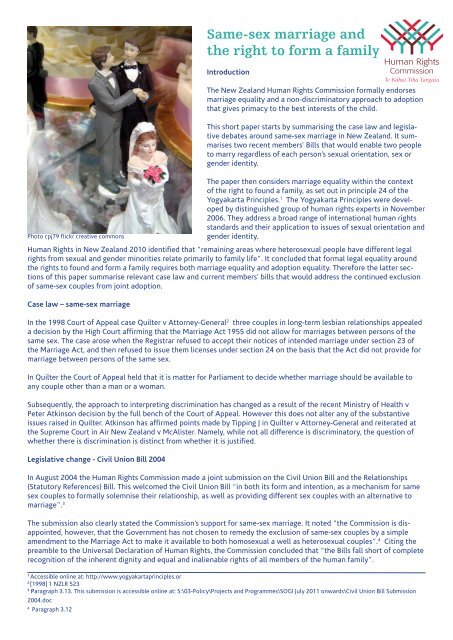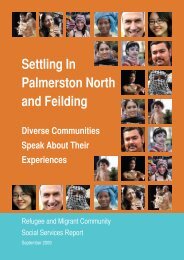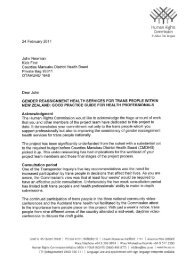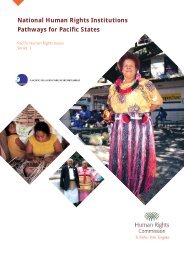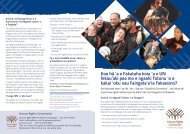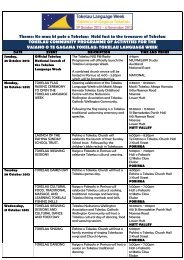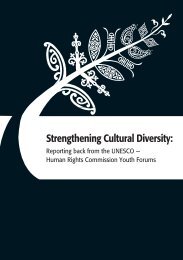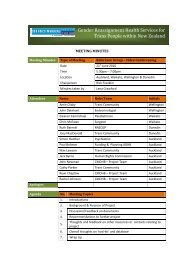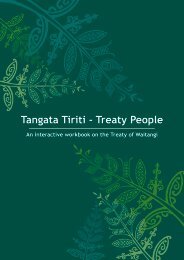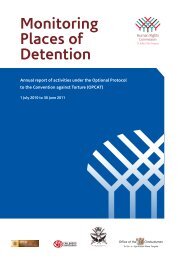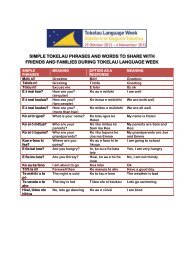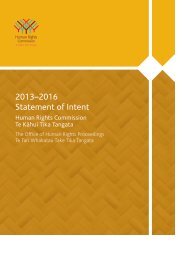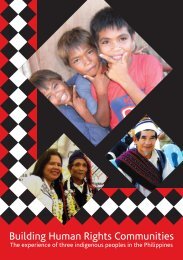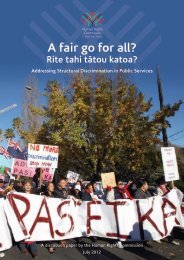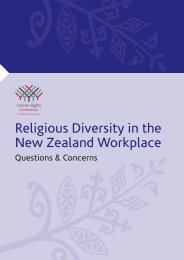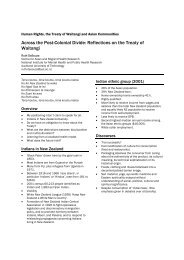Same-sex marriage and the right to form a family - Human Rights ...
Same-sex marriage and the right to form a family - Human Rights ...
Same-sex marriage and the right to form a family - Human Rights ...
Create successful ePaper yourself
Turn your PDF publications into a flip-book with our unique Google optimized e-Paper software.
Pho<strong>to</strong> cpj79 flickr creative commons<br />
<strong>Human</strong> <strong>Rights</strong> in New Zeal<strong>and</strong> 2010 identified that “remaining areas where hetero<strong>sex</strong>ual people have different legal<br />
<strong>right</strong>s from <strong>sex</strong>ual <strong>and</strong> gender minorities relate primarily <strong>to</strong> <strong>family</strong> life”. It concluded that <strong>form</strong>al legal equality around<br />
<strong>the</strong> <strong>right</strong>s <strong>to</strong> found <strong>and</strong> <strong>form</strong> a <strong>family</strong> requires both <strong>marriage</strong> equality <strong>and</strong> adoption equality. Therefore <strong>the</strong> latter sections<br />
of this paper summarise relevant case law <strong>and</strong> current members’ bills that would address <strong>the</strong> continued exclusion<br />
of same-<strong>sex</strong> couples from joint adoption.<br />
Case law – same-<strong>sex</strong> <strong>marriage</strong><br />
In <strong>the</strong> 1998 Court of Appeal case Quilter v At<strong>to</strong>rney-General 2 three couples in long-term lesbian relationships appealed<br />
a decision by <strong>the</strong> High Court affirming that <strong>the</strong> Marriage Act 1955 did not allow for <strong>marriage</strong>s between persons of <strong>the</strong><br />
same <strong>sex</strong>. The case arose when <strong>the</strong> Registrar refused <strong>to</strong> accept <strong>the</strong>ir notices of intended <strong>marriage</strong> under section 23 of<br />
<strong>the</strong> Marriage Act, <strong>and</strong> <strong>the</strong>n refused <strong>to</strong> issue <strong>the</strong>m licenses under section 24 on <strong>the</strong> basis that <strong>the</strong> Act did not provide for<br />
<strong>marriage</strong> between persons of <strong>the</strong> same <strong>sex</strong>.<br />
In Quilter <strong>the</strong> Court of Appeal held that it is matter for Parliament <strong>to</strong> decide whe<strong>the</strong>r <strong>marriage</strong> should be available <strong>to</strong><br />
any couple o<strong>the</strong>r than a man or a woman.<br />
Subsequently, <strong>the</strong> approach <strong>to</strong> interpreting discrimination has changed as a result of <strong>the</strong> recent Ministry of Health v<br />
Peter Atkinson decision by <strong>the</strong> full bench of <strong>the</strong> Court of Appeal. However this does not alter any of <strong>the</strong> substantive<br />
issues raised in Quilter. Atkinson has affirmed points made by Tipping J in Quilter v At<strong>to</strong>rney-General <strong>and</strong> reiterated at<br />
<strong>the</strong> Supreme Court in Air New Zeal<strong>and</strong> v McAlister. Namely, while not all difference is discrimina<strong>to</strong>ry, <strong>the</strong> question of<br />
whe<strong>the</strong>r <strong>the</strong>re is discrimination is distinct from whe<strong>the</strong>r it is justified.<br />
Legislative change - Civil Union Bill 2004<br />
In August 2004 <strong>the</strong> <strong>Human</strong> <strong>Rights</strong> Commission made a joint submission on <strong>the</strong> Civil Union Bill <strong>and</strong> <strong>the</strong> Relationships<br />
(Statu<strong>to</strong>ry References) Bill. This welcomed <strong>the</strong> Civil Union Bill “in both its <strong>form</strong> <strong>and</strong> intention, as a mechanism for same<br />
<strong>sex</strong> couples <strong>to</strong> <strong>form</strong>ally solemnise <strong>the</strong>ir relationship, as well as providing different <strong>sex</strong> couples with an alternative <strong>to</strong><br />
<strong>marriage</strong>”. 3<br />
The submission also clearly stated <strong>the</strong> Commission’s support for same-<strong>sex</strong> <strong>marriage</strong>. It noted “<strong>the</strong> Commission is disappointed,<br />
however, that <strong>the</strong> Government has not chosen <strong>to</strong> remedy <strong>the</strong> exclusion of same-<strong>sex</strong> couples by a simple<br />
amendment <strong>to</strong> <strong>the</strong> Marriage Act <strong>to</strong> make it available <strong>to</strong> both homo<strong>sex</strong>ual a well as hetero<strong>sex</strong>ual couples”. 4 Citing <strong>the</strong><br />
preamble <strong>to</strong> <strong>the</strong> Universal Declaration of <strong>Human</strong> <strong>Rights</strong>, <strong>the</strong> Commission concluded that “<strong>the</strong> Bills fall short of complete<br />
recognition of <strong>the</strong> inherent dignity <strong>and</strong> equal <strong>and</strong> inalienable <strong>right</strong>s of all members of <strong>the</strong> human <strong>family</strong>”.<br />
1<br />
Accessible online at: http://www.yogyakartaprinciples.or<br />
2<br />
[1998] 1 NZLR 523<br />
3<br />
Paragraph 3.13. This submission is accessible online at: S:\03-Policy\Projects <strong>and</strong> Programmes\SOGI July 2011 onwards\Civil Union Bill Submission<br />
2004.doc<br />
4<br />
Paragraph 3.12<br />
<strong>Same</strong>-<strong>sex</strong> <strong>marriage</strong> <strong>and</strong><br />
<strong>the</strong> <strong>right</strong> <strong>to</strong> <strong>form</strong> a <strong>family</strong><br />
Introduction<br />
The New Zeal<strong>and</strong> <strong>Human</strong> <strong>Rights</strong> Commission <strong>form</strong>ally endorses<br />
<strong>marriage</strong> equality <strong>and</strong> a non-discrimina<strong>to</strong>ry approach <strong>to</strong> adoption<br />
that gives primacy <strong>to</strong> <strong>the</strong> best interests of <strong>the</strong> child.<br />
This short paper starts by summarising <strong>the</strong> case law <strong>and</strong> legislative<br />
debates around same-<strong>sex</strong> <strong>marriage</strong> in New Zeal<strong>and</strong>. It summarises<br />
two recent members’ Bills that would enable two people<br />
<strong>to</strong> marry regardless of each person’s <strong>sex</strong>ual orientation, <strong>sex</strong> or<br />
gender identity.<br />
The paper <strong>the</strong>n considers <strong>marriage</strong> equality within <strong>the</strong> context<br />
of <strong>the</strong> <strong>right</strong> <strong>to</strong> found a <strong>family</strong>, as set out in principle 24 of <strong>the</strong><br />
Yogyakarta Principles. 1 The Yogyakarta Principles were developed<br />
by distinguished group of human <strong>right</strong>s experts in November<br />
2006. They address a broad range of international human <strong>right</strong>s<br />
st<strong>and</strong>ards <strong>and</strong> <strong>the</strong>ir application <strong>to</strong> issues of <strong>sex</strong>ual orientation <strong>and</strong><br />
gender identity.
The Marriage (Gender Clarification) Amendment Bill 2005<br />
The Marriage (Gender Clarification) Amendment Bill was introduced in 2005 as a members’ Bill. It sought <strong>to</strong> add a provision<br />
<strong>to</strong> <strong>the</strong> Marriage Act 1955, stating that <strong>marriage</strong> means a union between a man <strong>and</strong> a woman <strong>and</strong> not between two<br />
persons of <strong>the</strong> same <strong>sex</strong>. The bill also sought <strong>to</strong> amend <strong>the</strong> New Zeal<strong>and</strong> Bill of <strong>Rights</strong> Act 1990 <strong>to</strong> specify that measures<br />
taken in good faith for <strong>the</strong> purposes of assisting or advancing <strong>marriage</strong> do not constitute discrimination. The bill was<br />
defeated at its first reading by 73 votes <strong>to</strong> 47.<br />
<strong>Human</strong> <strong>Rights</strong> in NZ 2010<br />
The <strong>sex</strong>ual <strong>and</strong> gender minorities’ chapter in <strong>the</strong> Commission’s December 2010 report noted:<br />
Anything less than full legal recognition of same-<strong>sex</strong> relationships is of particular concern for vulnerable couples, including<br />
older people in residential care <strong>and</strong>/or when power of at<strong>to</strong>rney is being exercised on <strong>the</strong>ir behalf.<br />
In addition, <strong>the</strong> chapter highlighted <strong>the</strong> impact that <strong>the</strong> restriction of <strong>marriage</strong> <strong>to</strong> being between ‘a man <strong>and</strong> a woman’<br />
has on trans or inter<strong>sex</strong> people because <strong>the</strong>ir eligibility <strong>to</strong> marry, or <strong>to</strong> stay married, alters if <strong>the</strong>ir <strong>sex</strong> changes. This is<br />
fur<strong>the</strong>r complicated as judicial decisions about <strong>the</strong> threshold for changing <strong>sex</strong> details on a birth certificate are diverging<br />
from older 1995 case law on <strong>the</strong> threshold for being recognised as male or female under <strong>the</strong> Marriage Act. Nor is it clear<br />
if someone whose <strong>sex</strong> is recorded as indeterminate on a birth certificate is able <strong>to</strong> marry ei<strong>the</strong>r a man or a woman.<br />
<strong>Human</strong> <strong>Rights</strong> in NZ 2010 concluded that <strong>the</strong> relevant priority area for action was legal equality:<br />
• Completing <strong>the</strong> legislative steps required for <strong>form</strong>al legal equality, including <strong>right</strong>s <strong>to</strong> found <strong>and</strong> <strong>form</strong> a <strong>family</strong>,<br />
Marriage Equality – members’ Bills<br />
Since 2001 ten counties have amended <strong>the</strong>ir laws <strong>to</strong><br />
allow same-<strong>sex</strong> <strong>marriage</strong>. These are Canada, Ne<strong>the</strong>rl<strong>and</strong>s,<br />
Belgium, Norway, Sweden, Spain, Portugal,<br />
Icel<strong>and</strong>, South Africa <strong>and</strong> Argentina. In addition<br />
same-<strong>sex</strong> <strong>marriage</strong> has been legislated in some parts<br />
of <strong>the</strong> United States <strong>and</strong> in Mexico City.<br />
Recently both Labour MP Louisa Wall <strong>and</strong> Green Party<br />
MP Kevin Hague have submitted <strong>marriage</strong> equality<br />
bills that have been accepted in<strong>to</strong> <strong>the</strong> members’<br />
ballot. Louisa Wall’s Marriage (Definition of Marriage)<br />
Amendment Bill would amend <strong>the</strong> Marriage Act <strong>to</strong><br />
clarify that a <strong>marriage</strong> is between two people regardless<br />
of <strong>the</strong>ir <strong>sex</strong>, <strong>sex</strong>ual orientation or gender identity.<br />
5 Kevin Hague’s Marriage (Equality) Amendment<br />
Bill provides explicitly for same-<strong>sex</strong> couples in New<br />
Zeal<strong>and</strong> <strong>to</strong> marry. It includes a proposed amendment<br />
<strong>to</strong> <strong>the</strong> Births, Deaths, Marriages <strong>and</strong> Relationships<br />
Registration Act 1995 <strong>to</strong> allow someone who identifies<br />
as transgender or trans<strong>sex</strong>ual <strong>to</strong> marry. 6<br />
Pho<strong>to</strong> Mike Licht, NotionsCapital.com, flickr creative commons<br />
Case law - Adoption<br />
The Adoption Act 1955 provides that ‘two spouses’ or any individual, regardless of <strong>the</strong>ir <strong>sex</strong>ual orientation, are<br />
eligible <strong>to</strong> adopt in New Zeal<strong>and</strong>. The term ‘spouse’ has been interpreted as enabling only married couples <strong>to</strong><br />
adopt jointly.<br />
In June 2010, <strong>the</strong> High Court had <strong>to</strong> consider whe<strong>the</strong>r <strong>the</strong> expression ‘spouses’ in section 3 of <strong>the</strong> Adoption Act<br />
1955 can include a man <strong>and</strong> a woman who are unmarried but in a stable <strong>and</strong> committed relationship. It decided<br />
that such an interpretation was permissible <strong>and</strong> that reading ‘spouses’ <strong>to</strong> mean that only married couples may<br />
adopt jointly seemed <strong>to</strong> discriminate against o<strong>the</strong>r types of relationships which were commonplace in New Zeal<strong>and</strong>.<br />
However, <strong>the</strong> court limited its consideration of <strong>the</strong> issue <strong>to</strong> hetero<strong>sex</strong>ual opposite-<strong>sex</strong> couples, <strong>the</strong> status of<br />
<strong>the</strong> applicants in this case. 7 The current legal position, <strong>the</strong>refore, is that same-<strong>sex</strong> couples are unable <strong>to</strong> jointly<br />
adopt a child. In <strong>Human</strong> <strong>Rights</strong> in New Zeal<strong>and</strong> 2010 <strong>the</strong> Commission concluded:<br />
Given that a lesbian woman or gay man can apply <strong>to</strong> adopt a child as a sole applicant, <strong>and</strong> that same-<strong>sex</strong> couples<br />
can share <strong>the</strong> parenting of a child as legal guardians, it is anomalous <strong>and</strong> discrimina<strong>to</strong>ry under <strong>the</strong> <strong>Human</strong> <strong>Rights</strong><br />
Act <strong>and</strong> <strong>the</strong> Bill of <strong>Rights</strong> Act that a same-<strong>sex</strong> couple cannot adopt a child jointly.<br />
5<br />
Accessible online at: http://www.parliament.nz/NR/rdonlyres/07819230-A1EF-4A7B-B5C2-9D7A830AC40E/222836/MarriageDefinitionof-<br />
MarriageAmendmentBill_1.pdf<br />
6<br />
Accessible online at: http://www.parliament.nz/NR/rdonlyres/C29CDB15-FF6C-457C-B33E-CD45E1EEC519/225087/MarriageEqualityAmendmentBill_1.pdf<br />
7<br />
Re AMM [2010] NZFLR 629
O<strong>the</strong>r countries have changed <strong>the</strong>ir law <strong>to</strong> permit same-<strong>sex</strong> couples <strong>to</strong> adopt a child jointly. In Engl<strong>and</strong> <strong>and</strong> Wales, <strong>the</strong><br />
Adoption <strong>and</strong> Children Act 2002 broadened <strong>the</strong> eligibility criteria <strong>to</strong> allow unmarried couples, including same-<strong>sex</strong> couples,<br />
<strong>to</strong> adopt a child. Scotl<strong>and</strong> subsequently followed <strong>the</strong> same path. The Commission concluded:<br />
It is time for New Zeal<strong>and</strong> <strong>to</strong> follow suit by amending <strong>the</strong> Adoption Act <strong>to</strong> permit same-<strong>sex</strong> couples <strong>to</strong> jointly adopt a<br />
child, as part of re<strong>form</strong>s <strong>to</strong> this act making <strong>the</strong> best interests of <strong>the</strong> child <strong>the</strong> paramount consideration.<br />
Adoption equality – members’ Bills<br />
Two member’s bills are currently being proposed that would give effect <strong>to</strong> <strong>the</strong> Commission’s recommendation.<br />
In August 2011 Labour MP Jacinda Ardern tabled a Care of Children Law Re<strong>form</strong> Bill that requires <strong>the</strong> Law Commission<br />
<strong>to</strong> review <strong>and</strong> update adoption law <strong>and</strong> put <strong>the</strong> interests of children at <strong>the</strong> heart of any decision-making about <strong>the</strong>ir<br />
future . 8<br />
Ardern’s 29 July 2011 media release noted “<strong>the</strong> <strong>Human</strong> <strong>Rights</strong> Commission has confirmed that a review of adoption<br />
law is long overdue”. 9 It also mentioned <strong>the</strong> campaign by Adoption Action Inc <strong>to</strong> overhaul current adoption legislation<br />
including its complaint <strong>to</strong> <strong>the</strong> <strong>Human</strong> <strong>Rights</strong> Commission that current laws breach <strong>the</strong> NZ Bill of <strong>Rights</strong> Act <strong>and</strong> <strong>the</strong> <strong>Human</strong><br />
<strong>Rights</strong> Act. There are currently two complaints relating <strong>to</strong> <strong>the</strong> issue with DRT.<br />
Since <strong>the</strong> last parliamentary term, Green Party MP Kevin Hague has been publically attempting <strong>to</strong> draft legislation <strong>to</strong><br />
amend <strong>the</strong> Care of Children Bill 2004 based on a previous Law Commission report that looked at guardianship <strong>and</strong> adoption.<br />
This would include extending eligibility <strong>to</strong> adopt <strong>to</strong> couples o<strong>the</strong>r than those who are married. This work is now<br />
being progressed jointly with National Party MP Nikki Kaye <strong>and</strong> would include whängai adoption, surrogacy <strong>and</strong> age of<br />
adoption as well as same-<strong>sex</strong> adoption. 10 A private member’s bill <strong>to</strong> this effect is expected this year.<br />
New Zeal<strong>and</strong> <strong>Human</strong> <strong>Rights</strong> Commission’s position<br />
In order <strong>to</strong> ensure <strong>form</strong>al legal equality, including <strong>the</strong> <strong>right</strong> <strong>to</strong> found <strong>and</strong> <strong>form</strong> a <strong>family</strong> regardless of <strong>sex</strong>ual orientation<br />
or gender identity, <strong>the</strong> Commission <strong>form</strong>ally:<br />
• endorses <strong>marriage</strong> equality – namely <strong>the</strong> <strong>right</strong> <strong>to</strong> marry, <strong>form</strong> a civil union or a de fac<strong>to</strong> partnership regardless<br />
of one’s <strong>sex</strong>ual orientation, <strong>sex</strong> or gender identity.<br />
• endorses adoption equality - ensuring primacy is given <strong>to</strong> <strong>the</strong> best interests of <strong>the</strong> child irrespective of each<br />
person’s <strong>sex</strong>, gender identity, <strong>sex</strong>ual orientation, or disability or <strong>the</strong> couple’s marital status.<br />
For more in<strong>form</strong>ation, contact <strong>the</strong> <strong>Human</strong> <strong>Rights</strong> Commission<br />
0800 496 877 or infoline@hrc.co.nz<br />
or visit our website<br />
http://www.hrc.co.nz/human-<strong>right</strong>s-environment/<strong>sex</strong>ual-orientation-<strong>and</strong>-gender-identity<br />
Pho<strong>to</strong> yooperann flickr creative commons<br />
8<br />
Accessible online at: http://www.parliament.nz/NR/rdonlyres/A3A03E0E-D8C2-429B-879A-3EDCE7448E4C/211289/CareofChildrenLawRe<strong>form</strong>Bill_1.<br />
pdf<br />
9<br />
Accessible online at; http://jacinda.co.nz/index.php/2011/07/time-for-adoption-laws-need-shake-up/<br />
10<br />
A NZ Herald news report about this proposed amendment <strong>to</strong> <strong>the</strong> Care of Children Act 2004 can be accessed online at; http://www.nzherald.co.nz/<br />
nz-national-party/news/article.cfmo_id=266&objectid=10808932


